Download full guide
or read the summary below.
Online events offer huge opportunities. Hundreds of thousands of companies around the world have discovered this, and for many, the pandemic has become the driver to take action in this area. They include a wide variety of activities – webinars are increasingly used not only in education but also in the marketing strategies of brands. They allow for easy contact and direct reaching of interested recipients.
Of course, this also comes with a lot of responsibility. One of the most important aspects that an organizer of online events should take care of is the privacy of attendees and the security of the data they entrust.
In our latest report, we looked at how online privacy is approached by users themselves and what concerns they pay attention to. For this purpose, we conducted a survey among event participants in February 2022. This knowledge is particularly useful from the perspective of hosts. They can quickly find out what their audience really expects. In the report, you will also find proven tips to protect your privacy and that of your attendees during webinars and online meetings.
Table of Contents
Online privacy is crucial
In the era of digital threats, protecting one’s privacy becomes a serious challenge. At the same time, especially in a period in which most social activities have moved to the virtual space, the number of situations that may increase the risk of e.g. sharing one’s image or other personal data with unauthorized persons, is increasing.
We are well aware of the consequences this may entail. At the same time, the information that appears in the media from time to time shows that there is still a lot to be done in this area, and not all Internet users have the same understanding of the problem. So how do we evaluate our actions concerning online privacy protection?
Do you care about your privacy online?
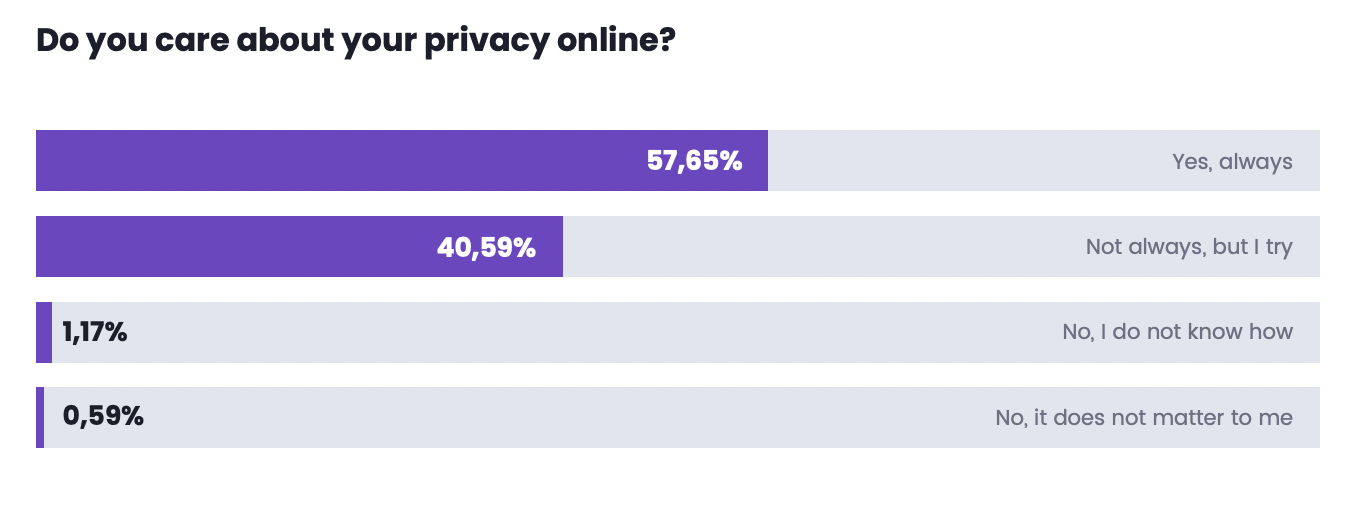
As you can see, almost all survey participants are aware of the importance of protecting privacy during various activities undertaken in virtual space. Only less than 2% of respondents state that they do not care about their privacy, but only for 0.59%, it does not matter at all.
Privacy during online events
We take part in them very willingly. Very often, it only takes a few clicks to sign up for an event and attend it. But, on the other hand, many companies organize webinars and use them, for example, in their marketing strategy.
Of course, for most attendees, the content and, for example, the prestige of the invited experts play a crucial role. How important is privacy for them? Are they willing to accept compromises in this area? It turns out that this is one of the most important factors!
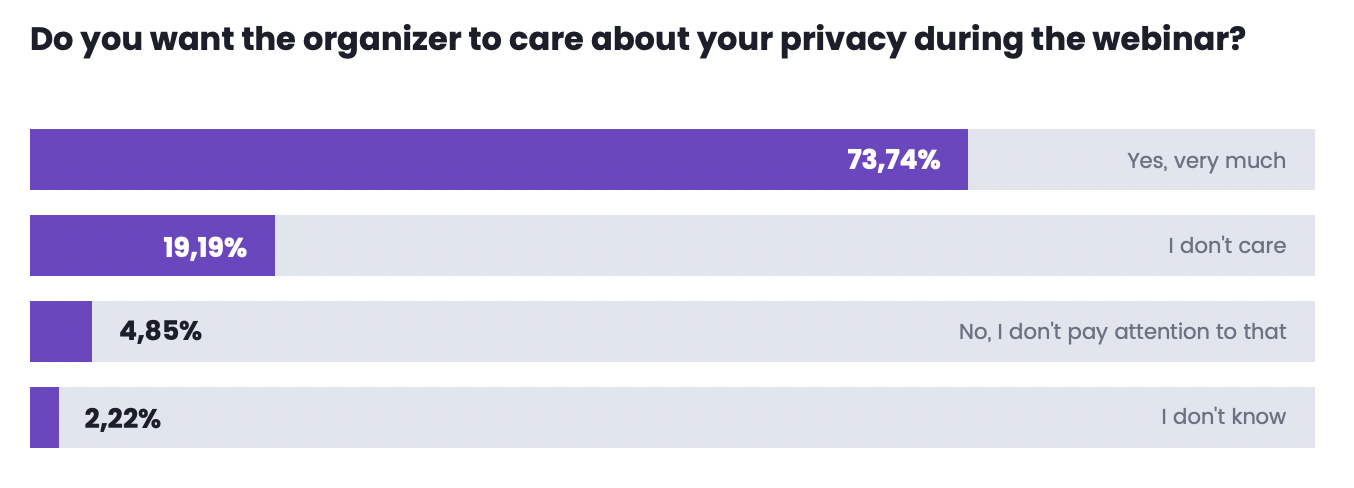
Take care of your attendees’ privacy!
The feeling of privacy convinces attendees to register and participate in a webinar. What’s more: it is the organizer’s duty to ensure it. What can they do to properly secure the needs of their participants? There are many possibilities, starting with the right choice of tools, through responsible behavior during the event itself, and ending with the actions taken afterward.
Try ClickMeeting for free!
A secure webinar platform from the participant’s perspective
When choosing software for webinars and online events, we usually pay attention to the list of available functions, the stable connection, and the intuitive user experience. These are obviously very important points, which directly impact both the organizer’s and attendees’ experiences. However, when comparing different tools, it is easy to overlook an essential factor, namely the appropriate care taken to ensure the privacy and security of processed data. What do event participants think about it?

Our data leaves no doubt. Over 90% of respondents care that the software they use guarantees them adequate security. This is also an important commitment for organizers. If you want to not only protect yourself from potential legal liability but also provide your guests with a comfortable environment in which to work and learn, choose a reliable tool that takes care of your privacy and that of your attendees.
Pay attention to GDPR
An event organizer acts as the controller of participants’ personal data. The webinar platform is the entity that processes personal data on behalf of the controller. According to GDPR, such entrustment of data requires the conclusion of an appropriate data processing agreement, which is most often done at the stage of concluding an agreement with the platform. Therefore, before you conduct a webinar, check whether the provider offers such an agreement, especially if it originates from outside the EU.
Data protection is a significant commitment, and of course, it is also regulated by law. In this respect, specific solutions apply to, among others, certain entities operating within the European Union. The GDPR has, in many ways, revolutionized the way we store and process personal data. It’s not just a set of regulations that European companies like ClickMeeting must respect. It’s also an attempt to set a global standard for data protection. Already, many customers from around the world approach it with confidence and consciously choose tools that include the guidelines resulting from GDPR.
Prepare a good registration form
The webinar itself is not everything. For an event to take place, attendees obviously need to sign up. The sign-up form also plays an important role from the organizer’s perspective. Very often, it not only allows you to register participants, but also helps you to generate leads.
Many companies, therefore, want their attendees to give permission for their data to be used for marketing purposes. While leveraging the potential of webinar marketing offers huge benefits, at the same time, it is easy to make mistakes here.
The organizer should make sure that the consent given when registering for a webinar complies with the applicable law. When a participant registers for a webinar they are agreeing with the organizer to participate in the webinar. So, one must include a mandatory checkbox on the registration form to obtain consent to the processing of personal data for this purpose. It is important to note that you can only collect data that is necessary to participate in the event, so don’t require details such as a work or home address. If, as an organizer, you collect other data, providing such data must be voluntary. The organizer can also collect voluntary consent from participants, e.g. for sending commercial information. With a platform such as ClickMeeting, you can easily configure the registration page by including both mandatory and voluntary consents. This allows participants to decide what information they want to share with you, as well as allowing you to comply with legal requirements.
Anna Zielińska – attorney at law at ClickMeeting
How do participants feel about giving both mandatory and additional consent?
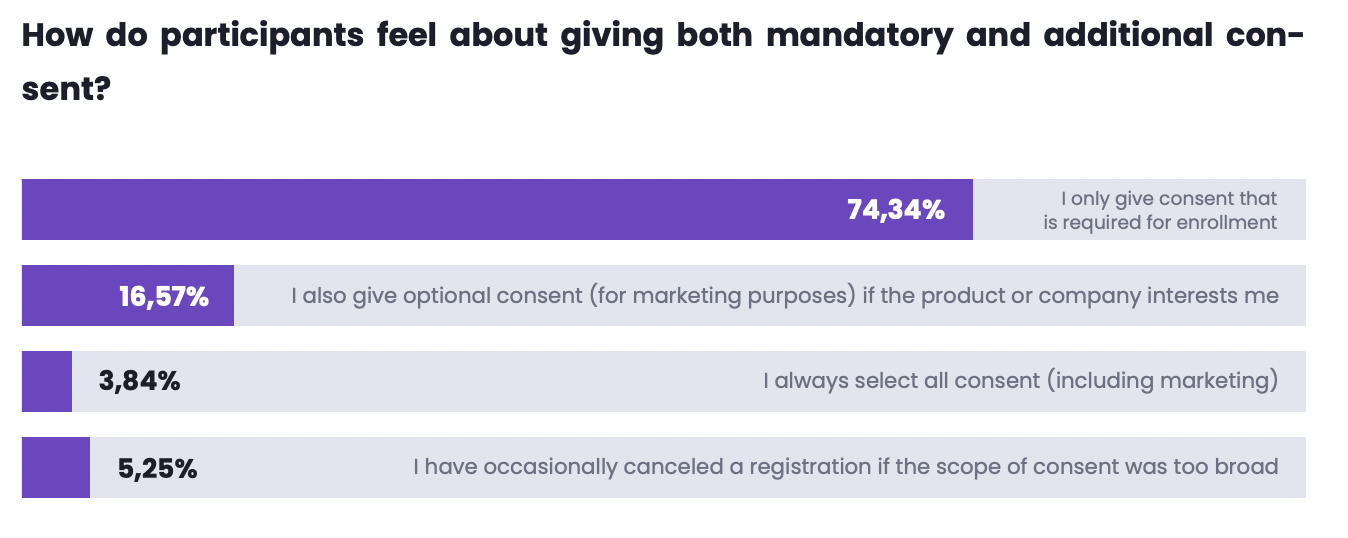
One in five event attendees is willing to voluntarily give consent for marketing purposes. This is truly huge potential. However, as you can see, for more than 16% of respondents, the crucial thing is whether they are interested in the company or product. So good quality content and effective communication can guarantee great results.
Try ClickMeeting for free!
Remember about informational obligations
Important documents that protect the rights of both attendees and presenters are, of course, the event terms and conditions, and privacy policy. They should clearly define the rules of participation in the webinar and inform participants, among other things, of their rights regarding the protection of their privacy.
It is a good idea to create a website with comprehensive details on how you handle personal data collected during the event. You can do this in a shorter form, i.e., an informational obligation, or in a longer form, i.e., a privacy policy describing issues related to the processing of personal data in all aspects of your business. The information provided to participants should include, among other things, the identity and contact details of the data controller, i.e. the organizer of the event, the purpose of data processing, the period of data storage, information on the participants’ rights, including the right to access, rectify or erase personal data, and an indication of the entities with whom such data may be shared.
Anna Zielińska – attorney at law at ClickMeeting
Is it relevant to the users? It turns out, absolutely.
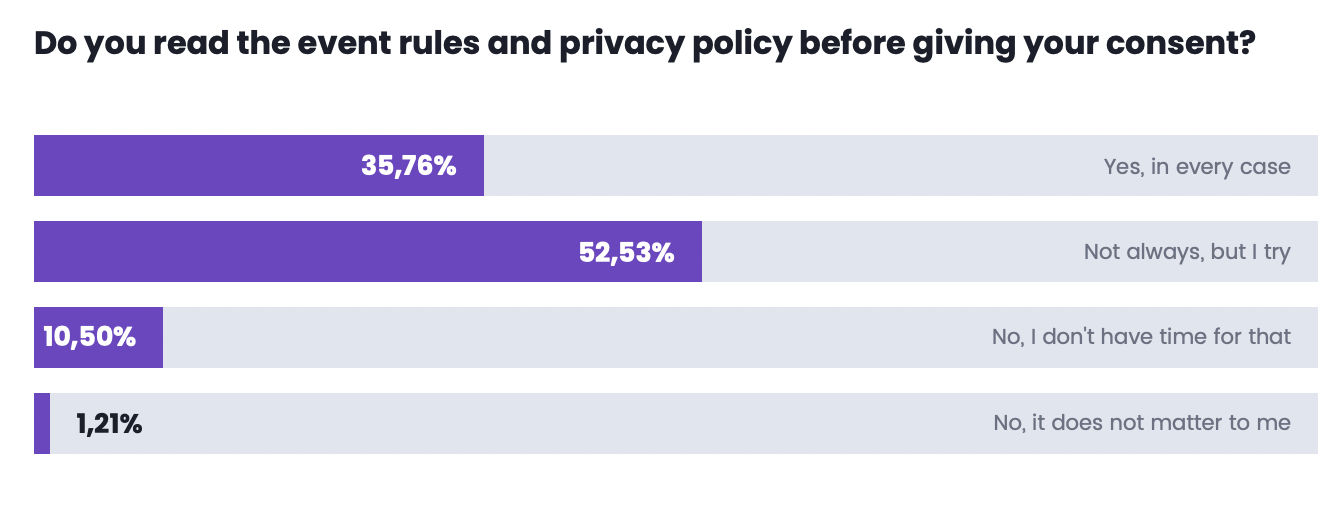
The vast majority of attendees read the event rules or privacy policy before checking the appropriate checkbox. Only less than 12% skip them, and a mere 1.21% of survey participants consider it irrelevant.
Pay attention to attendee data in the event room
What data do users provide when logging into an event? It turns out that most of them prefer to maintain at least partial anonymity. If possible, more than half of them enter only a nickname and email address. Only 4% use their full name.
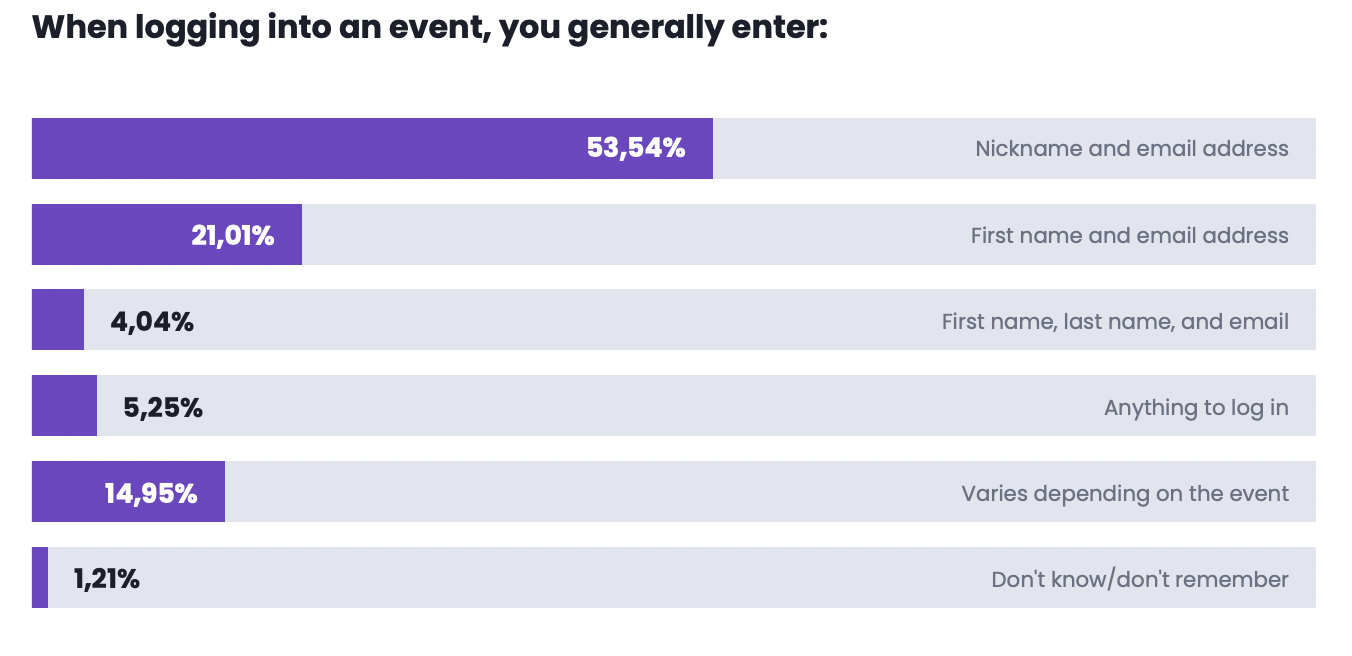
The organizer has a crucial role in creating a sense of security. By choosing the right platform, they will be able to take advantage of additional options to make attendees feel comfortable. These include hiding attendee data from public view (e.g. in the chat window or during Q&A sessions). It turns out that this is also important from their perspective.
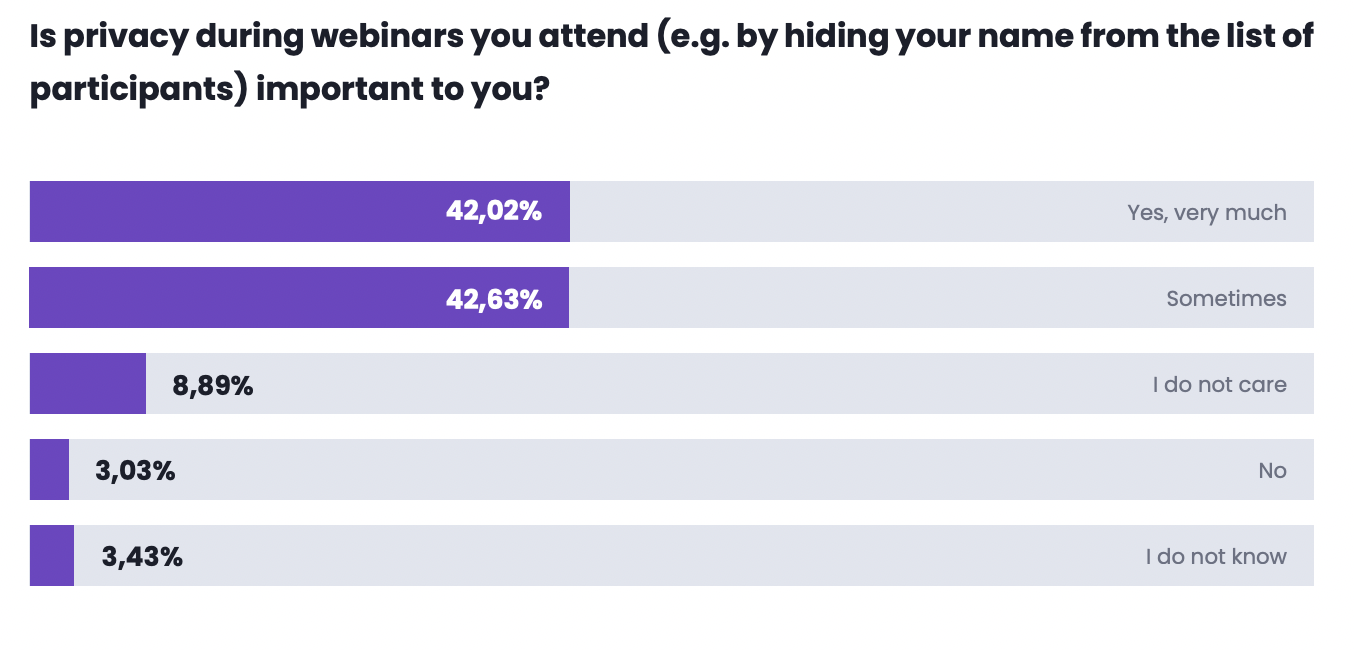
Inform participants about recording
Recording events is an extremely important feature. It allows you to create video footage that can then be shared with attendees, people who registered but didn’t show up at the event, or to use it in completely different channels. At the same time, it often happens that the image or personal data of other people are captured on the recording (e.g. when you ask a webinar attendee to take the floor or record an online meeting with your colleagues or students).
The most serious mistake an event organizer can make is not informing attendees that the event is being recorded. It turns out that this is very important to them!

The survey was conducted by ClickMeeting in February 2022 on a sample of 510 online event attendees. The group consisted of 52% women and 48% men in different age groups – 18-34 years 26%, 35-54 years 35%, over 55 years 39%.
Try ClickMeeting for free!
Have you taken care of the privacy of your attendees? A quick checklist for the host
As you can see, protecting the privacy and data of attendees is an extremely important issue that is not only a legal obligation for organizers; it’s also being addressed by the attendees of online events themselves! Ensuring a safe space doesn’t have to be difficult. Here are some basic elements you should pay attention to.
-
Choose a secure platform: remember that, as the organizer, you are the custodian of your participants’ personal data. However, the platform is responsible for processing them. Pay attention to the security procedures it provides. Make sure they comply with the current legal standards.
-
Reduce the required data to the bare minimum: the personal data you request from your participants should only be collected to the extent necessary for a specific purpose, e.g. taking part in a webinar.
- Develop Terms of Use and Privacy policy: be clear and provide your attendees with as much information as possible about how they can participate in the event and how their personal data will be stored and processed.
-
Indicate obligatory and voluntary consents: obtaining consent from participants is very easy. You can use the appropriate checkboxes on the registration page. You should also decide which consents are obligatory and which are voluntary.
-
Use the space: A good webinar and online meeting platform gives you plenty of opportunities to interact with your audience. You can put information about personal data processing, privacy, copyright, and business confidentiality on the registration page, in the waiting room and on automated mailings.
-
Secure your event: During a webinar, you share your knowledge and often provide additional content. If you want to protect such content, secure your event with a password or a one-time token.
-
Inform attendees about recording: if you plan to record your event, let attendees know about it at the very beginning. Include in your privacy policy, for example, how you will use the recordings.
-
Hide the identities of attendees: one of the available options allows you to hide attendees’ details, e.g. on the attendance list or in the chat window. So instead of the first name or first and last name, only the initials will appear, and the rest of the letters will be replaced by asterisks. As our study proves, many attendees expect this.
Download full guide
Disclaimer. The information on the legal aspects of hosting webinars in this guide is based on EU law. If you use the ClickMeeting Platform in the European Economic Area and use certain features within the Platform, it is likely that the obligations mentioned above apply to you.








